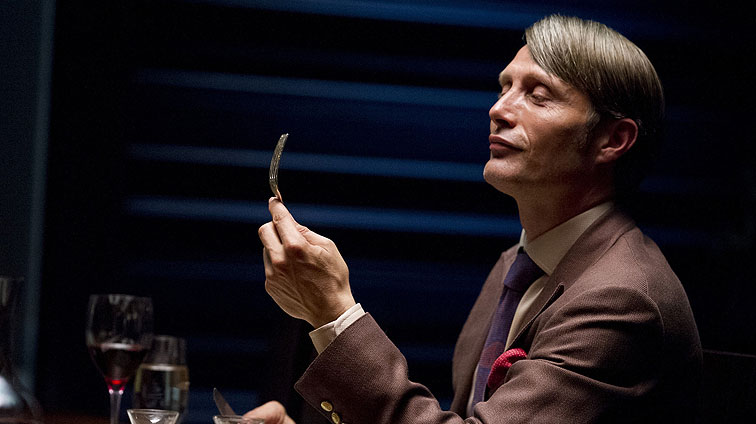
It's a Matter of Taste
Bryan Fuller, showrunner of NBC's new acclaimed series Hannibal, dishes on what made him want to take on everyone's favorite brain-eating sociopath and where the show draws the line when it comes to its bloody, graphic violence.
 Bryan Fuller
Bryan Fuller
Death is an honorable, awesome, horrifying experience that ranges from something serene to something horrifying. There's a story in the punctuation of every life and that punctuation informs the sentence before it.
Bryan Fuller's childhood was filled with funerals.
But unlike the joyfully macabre endings that litter his shows (Dead Like Me, Pushing Daisies, and the new NBC series Hannibal, to name a few), the deaths of his youth were more mundane. "There were just a lot of old people in the family," the veteran showrunner shrugs.
The way the grown-ups around him reacted to these deaths, however, was somewhat unique. "Everybody went out of their way to make sure funerals were positive events for a young child," Fuller tells the Writers Guild of America West website, explaining his penchant for creating shows like Hannibal a prequel to the literary adventures of everyone's favorite brain-eating sociopath. "There was a lot of This is a celebration of this person' as opposed to Oh my God, that's horrible' because you don't want to put that on a kid's head."
The experience created a positive association that's served him well as a writer. "Death is an honorable, awesome, horrifying experience that ranges from something serene to something horrifying," he says. "There's a story in the punctuation of every life and that punctuation informs the sentence before it."
How did Hannibal come to you?
It was very fortuitous. On a flight, I happened to sit behind a friend of mine, Katie O'Connell, who just became the CEO of Gaumont Television. She asked me, "What do you think about the idea of doing a Hannibal TV show?" Not for me necessarily to work on but just as a concept. I was very intrigued. My first question was, "Do you have the Will Graham character?" and she said, "Yes." I said, "Well, that's your TV series."
In the show, you have the procedural element, the serialized element, and the franchise. How do you weave all those things together?
It was about going back to the source material in the book and then seeing what hasn't been explored. One of the things that was exciting for me is that there's such a rich mythology behind the character of Will Graham and you get such specific details of his life before Red Dragon, but in just dribs and drabs, little morsels. So it was fun to think about how to keep that story ongoing as well as have a procedural-like element that gives you a metaphor for what Will Graham is experiencing in the episode emotionally. For instance, in "The Mushroom Man" episode, it's about a man who's trying to make connections in a very unconventional way and so that serves as Will's foray into receiving therapy and connecting in a very intimate way. It seems like it was kind of an interesting weave.
In which direction do you work to achieve that? Would you say, "Oh, he needs therapy," and then devise some murders out of that or would you come up with some cool murders and try to figure out what lessons your characters would learn from them?
It's exactly the latter. We totally think about the cool thing and then figure out what the metaphor is for Will and if we can't figure out what the metaphor is we change it. But whatever the cool thing is the Grand Guignol horror esthetic of the show it has to connect emotionally to Will Graham's experience. That's sort of the rule.
The central characters are nothing like normal people. They don't see the world the way we do, and yet we have to root for them and love them. How do you do that?
For Will Graham, there's a line in the pilot about him being on the spectrum of autism or Asperger's, and he's neither of those things. He actually has an empathy disorder where he feels way too much and that's relatable in some way. There's something about people who connect more to animals than they do to other people because it's too intense for whatever reason.
So he's the opposite of a sociopath.
Yes, yes, he is pure empathy, and that's kind of what Hannibal Lecter's trying to tap into. It's like if he's pure empathy, then he will reflect my crazy.
But let's take Hannibal. He's this awful guy who eats lungs, but you kind of like him. How do you do that?
It's hard not to like somebody who has passion for life. That's sort of the interesting and scary thing about Hannibal Lecter. He admires beauty in all of its horrible, repugnant forms to its sweetest, most beautiful forms. So he's not discriminating that way.
If you come up with an episode where Hannibal's just too despicable, do you fall back on that character trait to make him more sympathetic?
For me, it's wanting to like Hannibal myself as a person who has to think about that character a lot. It's about finding the kind of odd, David Lynchian way into this character in a chapter of his life that we haven't seen before and make him empathetic.
How do you know when to draw the line with the violence in the show?
It's about the psychology in the storytelling. Are we saying something new or different or interesting with the psychology of this villain?
But there's an episode that we're not going to air that was conceived pre-Sandy Hook. We weren't as sensitive then in the conception of it as we are now.
It was something that was in the making for a while, and we were like should we, shouldn't we, should we, shouldn't we, should we, shouldn't we? So we decided not to, and we made webisodes using parts of the show. It is a really interesting episode, and Hannibal does some very bold things. It seemed like it was a good thing to do on many fronts, not the least of which was being sensitive.
To keep that serial going, are people going to need to watch the webisodes or did you fill in those blanks in other shows after?
It helps to see them but no. It's an interesting side chapter of the story between Hannibal and Abigail Hobbs. It was a contained story in and of itself.
It worked out really well, so I'm excited that we're going to roll it out in this way. It also gets us to the finale sooner, which I can't wait for people to see.
So when you're making judgment calls on deciding how violent the show can be, you look at the zeitgeist and kind of work back from that?
It definitely has influence. As storytellers, we exist in a time where it's hard not to be sensitive to what's happening in the world.
© 2013 Writers Guild of America West
